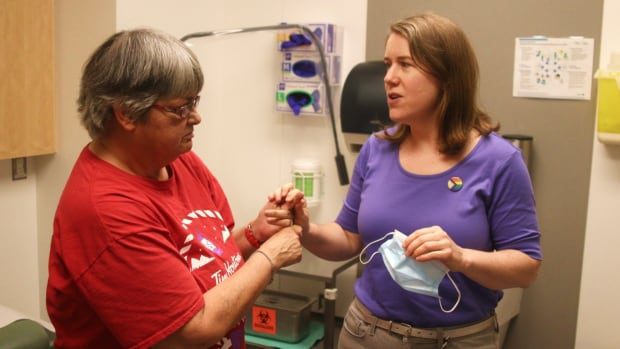Global Courant 2023-05-20 17:00:00
White Coat Black Art26:30The secret to success at Community Health Centers
On any given day, staff at Centretown Community Health Center near downtown Ottawa see a wide variety of patients, from out-of-home to seniors to families with young children struggling to find a primary care physician.
Similar to a school catchment area, the idea is that anyone living in the area—including the Glebe, Centretown, and Old Ottawa South—can automatically qualify for the center’s services. It is an attempt to close the gaps in a province where more than two million people do not have primary care.
Now, however, like primary care offices across the country, it is struggling with capacity issues of its own. As community health centers (CHCs) strive to be more efficient with their existing staff to address some of these issues, advocates are calling for health ministries to expand their efforts to provide more team-based healthcare.
Clinic staff and other primary care providers say the rest of Canada can learn a lot from Centretown’s model of collaborative, comprehensive care and location-based access to primary care physicians.
The Centretown Community Health Center offers location-based access to GPs. (Trevor Pritchard/CBC)
Unlike a general practice, which only deals with primary care, the CHC model works in partnership with general practitioners and other health professionals, such as nurses, social workers and dietitians. This way doctors can concentrate on the medical piece while patients have access to a range of care under one roof.
Centretown started in 1969 as a community center, the first of its kind in Ontario, and became a community health center in 1974.
Clients have access to a range of services from harm reduction and showers for the homeless to mental health services, help finding emergency shelter and an early childhood program for families with children under the age of five.
Health professionals, dietitians and physiotherapists are also on hand.
The center’s mission is to meet the health and social needs of clients that are complex and can be rejected by physicians who are limited to standard, brief appointments.
“If they’re too complex, we say, ‘Yes, we’re the place to serve you,'” says Michelle Hurtubise, the clinic’s executive director.
Michelle Hurtubise is the Executive Director of the Centretown Community Health Center. It is set up as a non-profit organization with the doctors and nurse specialists employed by the center. (Trevor Pritchard/CBC)
It is also one of the few primary care practices in Ottawa that provides gender affirming care to transgender people.
Family docs prevent minor biz headaches
Another unique aspect of Centretown’s model is the clinic’s staffing. Unlike traditional family practices, where physicians typically operate as small businesses — with high overheads and significant administrative responsibilities, such as hiring and firing — Centretown is set up as a not-for-profit organization where the more than 220 full-time and part-time physicians and nurse practitioners are employees. from the center.
“I don’t want to be a small business owner. I want to do what I was trained to do, which is become a doctor,” says Dr. Erin Hanssen, one of the doctors at Centretown.
Dr. Erin Hanssen is one of the center’s doctors, who are also paid in a way that differs from their fee-paying counterparts. (Trevor Pritchard/CBC)
Physicians are also paid in a way that differs from their fee counterparts, providing them with a stable income plus pension and benefits.
That difference has made hiring much easier, says Hurtubise. While GP practices and staffing positions have gone unfilled elsewhere in the country, she says they’ve been “lucky that we haven’t actually had any problems with recruitment.”
LOOK | Behind the shortage of general practitioners in Canada:
What’s Behind the Shortage of General Practitioners in Canada?
GPs dr. Kamila Premji and Dr. Rita McCracken discuss the shortage of general practitioners in Canada and what can be done to alleviate the situation.
Centretown is largely funded by the Department of Health, with 85 percent of their funding coming from the county.
Responding to a critical need echoed through the whole countryCentretown doctors point to their extensive patient list – they have nearly 15,000 clients – and successful health outcomes as proof that this health care model is working.
Team-oriented approach to care
There are currently approx 120 CHCs across Canada, with new ones in the making. The model is part of a changing landscape of primary care, which many doctors say puts the patient first.
“I think the team-based approach works best for the client because they can get the service they need when they need it,” says Centretown physician Dr. Alison Eyre.
We prevent limb amputations, retinopathy, high blood pressure and hypertension and then become a very cost-effective model.-Michelle Hurtubise
She points to the clinic’s ability to quickly provide patients with specific services, whether it be immunization, a social worker or an outreach nurse. “Most of our fee-for-service[clinics]don’t have access to such resources,” she says.
Hurtubise also says CCHC has “better outcomes across the board” for their clients when it comes to things like diabetes, blood pressure control and smoking cessation. “So that’s a huge health care savings,” she says.
For example, she says someone with diabetes who is on a CHC can see an OHIP-covered dietitian to get control of their blood sugar, and other health professionals they may need, such as a foot sole pedicure.
“We prevent limb amputations, retinopathy, high blood pressure and hypertension and then become a very cost-effective model,” she said.
In addition, they may encounter a smoother referral process because doctors know they are referring patients to specialists experienced in vulnerable or underserved communities.
“I think team-based care produces better outcomes, period,” Dr. Jennifer Rayner, the director of research and evaluation at Alliance for Healthier Communities, a research program that helps determine how Ontario’s health care system can better serve vulnerable populations.
Patient Amanda Massia, center, sits in an exam room at the Centretown Community Health Center and speaks with Dr. Erin Hanssen, right, and Michelle Hurtubise. (Trevor Pritchard/CBC)
Rayner also sees opportunities for places like Centretown to reach communities that may be overlooked by the medical profession.
She points to “tons and tons evidencethat institutions such as Centretown support communities “often not visible” elsewhere.
“We saw that despite CHC serving a population that was 70 percent more complex than the average Ontario, they went to the emergency room less often,” she says.
Researchers too found it a 21 percent lower than expected number of emergency department visits for CHC clients compared to the county average.
Community health centers in Canada regularly take on more racial and low-income patients than traditional doctor’s offices, says Dr. Andrew Boozary. (Submitted by the University Health Network)
Dr. Andrew Boozary, a primary care physician and the executive director of public health and social medicine at Toronto’s University Health Network, agrees. He says CHCs in Canada regularly take on more racial and low-income patients than traditional doctor’s offices.
“There is no risk adjustment or incentive for family health teams to take on sicker, poorer, racialized patients,” he said.
That’s why, he says, there’s often such a “mismatch in where the care needs are and the kind of primary care resources that are made available.”
LOOK | Inside the GP crisis in Canada:
‘I feel like a failure’: Canada’s GP crisis
The crisis in family medicine has two sides and profound consequences for all of us. Nick Purdon meets an elderly patient in rural Ontario, who has been looking for a family doctor for a year, and an overwhelmed family doctor who admits she misses things with her patients.
Hanssen says this is certainly the case for patients like Amanda Massia who would otherwise struggle to find the right care.
“Amanda is on a steady income. Amanda has significant medical and mental health issues and she smokes. So substance use is also part of her challenges,” she says.
For Massia, the care she receives in Centretown is ‘very, very important’. She says she has been in and out of mental health facilities for much of her life and prefers the approach at CCHC. “It’s not nice to be locked up in a ward. Being free and being able to talk to someone is a lot better,” she says.
From left to right, Michelle Hurtubise, patient Amanda Massia, and Dr. Erin Hanssen outside the clinic in downtown Ottawa. (Trevor Pritchard/CBC)
In Centretown, Massia receives what is known as comprehensive primary health care, which differs from standard primary care, says Dr. Hanssen. She sees primary care as managing disease, while primary health care also includes health promotion and disease prevention.
Center now maximum
But even Centretown isn’t immune to the kinds of capacity issues that often hamper Canadians’ search for family care.
“Unfortunately, we are at maximum capacity,” says Hurtubise of the clinic. While it remains open for walk-in services such as mental health and addiction, even those living in its catchment area are being turned down when it comes to GPs.
“Unfortunately, although we are in the Centertown CHC catchment area and have tried it in the past, they are known not to take new patients,” says Carolyn Inch, an Ottawa resident, a senior who says while she thinks the Centertown model is superior to traditional fee-for-service providers, so far she has not been able to access their services. “There is a need for a complete rethink of our approach to healthcare,” she said.
Hurtubise understands Inch’s frustrations. “Some of the conversations we have (are) ‘So what can we do in our own systems to increase capacity? What are the ways we can look at improving some of our own efficiencies?'” she says .








